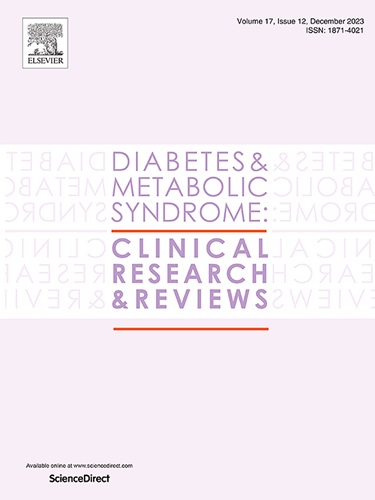预测 2 型糖尿病全因死亡率的机器学习和统计模型:英国生物库研究结果
IF 4.3
Q1 ENDOCRINOLOGY & METABOLISM
Diabetes & Metabolic Syndrome-Clinical Research & Reviews
Pub Date : 2024-09-01
DOI:10.1016/j.dsx.2024.103135
引用次数: 0
摘要
目的本研究旨在比较当代机器学习模型与统计模型在预测 2 型糖尿病患者全因死亡率方面的性能,并开发一种用户友好型死亡风险预测工具。方法开展了一项前瞻性队列研究,研究对象包括英国生物库中的 22579 名糖尿病患者。评估的模型包括 Cox 比例危险、随机生存森林 (RSF)、梯度提升 (GB) 生存、DeepSurv 和 DeepHit。机器学习模型在验证数据集中的表现优于 Cox 模型,C 指数值为 0.72-0.73 而 Cox 为 0.71(p < 0.01)。深度学习模型,尤其是 DeepHit,表现出了卓越的校准能力,并获得了较低的 Brier 分数(Cox 为 0.09,DeepHit 为 0.10,p <0.05)。基于DeepHit开发的在线预测工具可用于患者护理:http://123.57.42.89:6006/.ConclusionsMachine 学习模型的表现优于统计模型,凸显了机器学习技术在预测全因死亡风险和促进糖尿病患者个性化医疗管理方面的潜力。本文章由计算机程序翻译,如有差异,请以英文原文为准。
Machine learning and statistical models to predict all-cause mortality in type 2 diabetes: Results from the UK Biobank study
Aims
This study aims to compare the performance of contemporary machine learning models with statistical models in predicting all-cause mortality in patients with type 2 diabetes mellitus and to develop a user-friendly mortality risk prediction tool.
Methods
A prospective cohort study was conducted including 22,579 people with diabetes from the UK Biobank. Models evaluated include Cox proportional hazards, random survival forests (RSF), gradient boosting (GB) survival, DeepSurv, and DeepHit.
Results
Over a median follow-up period of 9 years, 2,665 patients died. Machine learning models outperformed the Cox model in the validation dataset, with C-index values of 0.72–0.73 vs. 0.71 for Cox (p < 0.01). Deep learning models, particularly DeepHit, demonstrated superior calibration and achieved lower Brier scores (0.09 vs. 0.10 for Cox, p < 0.05). An online prediction tool based on the DeepHit was developed for patient care: http://123.57.42.89:6006/.
Conclusions
Machine learning models performed better than statistical models, highlighting the potential of machine learning techniques for predicting all-cause mortality risk and facilitating personalized healthcare management for individuals with diabetes.
求助全文
通过发布文献求助,成功后即可免费获取论文全文。
去求助
来源期刊

Diabetes & Metabolic Syndrome-Clinical Research & Reviews
ENDOCRINOLOGY & METABOLISM-
CiteScore
22.90
自引率
2.00%
发文量
248
审稿时长
51 days
期刊介绍:
Diabetes and Metabolic Syndrome: Clinical Research and Reviews is the official journal of DiabetesIndia. It aims to provide a global platform for healthcare professionals, diabetes educators, and other stakeholders to submit their research on diabetes care.
Types of Publications:
Diabetes and Metabolic Syndrome: Clinical Research and Reviews publishes peer-reviewed original articles, reviews, short communications, case reports, letters to the Editor, and expert comments. Reviews and mini-reviews are particularly welcomed for areas within endocrinology undergoing rapid changes.
 求助内容:
求助内容: 应助结果提醒方式:
应助结果提醒方式:


